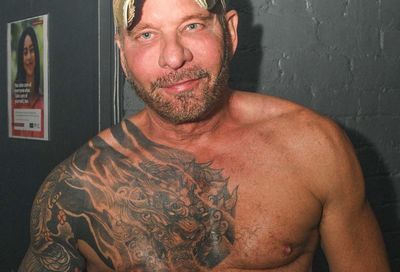November Impact: Upcoming elections LGBT voters should know about
A handful of smaller, low-profile elections could impact progress on LGBT rights

With all the attention that’s been lavished upon next year’s presidential race, one could almost be forgiven for not realizing there are elections this November for local and statewide offices.
Despite the lack of a showy, controversial frontrunner like Donald Trump, who can attract the attention of millions with his unconventional style, local and state elections are often consequential and likely to have a profound impact on the lives of LGBT voters, particularly those living in more conservative states.
For instance, in Houston the fate of the LGBT community could literally swing on a few thousand votes. While Houston is holding municipal elections this year, the city’s voters will also be determining the fate of a ballot initiative known as Proposition 1, meant to keep in place the Houston Equal Rights Ordinance (HERO), which provides nondiscrimination protections in employment, housing and public accommodations to LGBT Houstonians.
Of the 13 candidates running to succeed out lesbian Mayor Annise Parker, only two have not embraced Proposition 1. The first, Ben Hall, vehemently opposes HERO, while the second, Bill King, has avoided taking a firm position on the issue. King told FOX 26 Houston in July that he saw “no need” for a nondiscrimination ordinance. However, he later clarified that remark, insisting that while he is not in favor of discrimination, he is concerned about the effects of the law. King has raised objections to allowing transgender individuals to use the restroom they feel appropriate, echoing claims made by HERO opponents that the law will somehow put women and children at risk.
If no mayoral candidate receives a majority of the vote, the top two finishers head to a runoff. But King’s lack of a firm stance on HERO underscores the two-step dance he’s forced to perform: to get to the runoff, he must galvanize conservatives to support his candidacy, but can’t afford alienating moderates in a city where Democrats hold a political edge. Because he is polling the best of the three Republicans in the race, the bulk of conservative voters — and HERO opponents — are expected to throw their support to King, which might be enough to get him into the runoff.
But King has also raised the specter that, if elected, he may not drop the issue if the voters choose to pass HERO. While he said he would “honor the will of the voters” if HERO is repealed, he did not extend that same courtesy should supporters of the ordinance prevail. Instead, he said that he would offer amendments to the ordinance that specifically focus on the issue of transgender restroom use.
The fate of Proposition 1 is hard to predict. One poll shows opponents of HERO holding a nine-point edge over supporters, with a significant chunk of voters either unsure or refusing to answer. Two other polls give HERO supporters the edge, with large numbers of undecided voters, the bulk of whom are expected to break largely against Proposition 1. As a result, political observers are predicting a close finish when it comes to deciding whether LGBT people in Houston will be protected against discrimination.
Closer to home, the battle for control of the Virginia Senate has the makings of a barn-burner, as Democrats and Republicans attempt to seize enough seats to control the upper chamber. With the retirement of moderate Republican Sen. John Watkins (R-Richmond City, Bon Air, Midlothian), the GOP have only one senator remaining in their caucus who has consistently voted for nondiscrimination legislation. Moreover, whichever party gains the majority will be in control of the committees that are slated to hear pro-LGBT legislation in January, which could determine whether bills are killed or allowed to be voted upon by the full Senate.
In contrast, Republicans maintain a stranglehold on the House of Delegates, leaving LGBT activists who see the lower chamber as a graveyard for pro-equality legislation to hope that Democratic candidates can cut down the GOP’s wide margin.
Because the political parties recognize how slim their margins are, both are pouring the bulk of their money and canvassing efforts into a handful of Senate races. Besides Watkins’ old seat, which is a rare equal-opportunity seat for either party, Democrats are playing offense in two seats in Hampton Roads, and another in Northern Virginia against the conservative firebrand and fierce LGBT opponent Sen. Dick Black (R-Leesburg, Lovettsville, Purcellville, Gainesville), who faces Dr. Jill McCabe in this Loudoun County-based seat. Republicans, meanwhile, have fielded strong challengers against pro-LGBT senators including John Miller (D-Newport News, Williamsburg, Hampton) and John Edwards (D-Roanoke, Pearisburg, Blacksburg).
Another local race of interest for LGBT political observers is the re-election campaign of Loudoun County Supervisor Eugene Delgaudio (R-Sterling), a vocal opponent of the LGBT community who doubles as the head of the anti-gay group Public Advocate of the United States. Delgaudio, who has frequently ruffled the feathers of many, including some of his colleagues on the entirely Republican Board of Supervisors, faces off against Democrat Koran Saines.
But the biggest local battles with the most fireworks are largely expected to be the races for the Fairfax County School Board. The Democrat-dominated board has voted twice in the past year to expand its nondiscrimination policies to include sexual orientation and gender identity. In response, groups like the Traditional Values Coalition, the Virginia Christian Alliance, and grassroots conservative activists have pounced, waging a “throw the bums out” covert campaign against several incumbent board members. While the nondiscrimination policy is not the only issue being debated among school board candidates, it is one of the more prominent ones. And, most notably, it has been raised either directly or indirectly by almost all non-incumbent candidates, particularly those who have been endorsed by the Fairfax County Republican Committee.
Lastly, 2015 features three governor’s races — as well as races for statewide office and for the state legislature — in Mississippi, Louisiana and Kentucky. It’s the third in that trio that could prove most interesting for the casual LGBT observer, as Gov. Steve Beshear (D) is term-limited. Democratic Attorney General Jack Conway is in a tight race with Republican businessman Matt Bevin to succeed him. Both Conway and Beshear have been under attack for weeks for their connections to the controversy being played out in Rowan County, where Clerk Kim Davis has galvanized social conservatives with her opposition to being forced to issue same-sex marriage licenses.
Conway has been attacked by Bevin and his allies for refusing to defend Kentucky’s ban on same-sex marriage after a federal judge declared it unconstitutional. According to critics, Conway should have appealed that decision to the Supreme Court. Beshear, in his role as governor, stepped in to help defend the ban, which was eventually overturned. But Beshear has received a backlash for refusing to call a special session of the legislature to pass a bill that would allow county clerks like Davis to refrain from issuing licenses to same-gender couples. Such a measure has more than enough votes to pass, not only with support from Republicans, who control the state senate, but from Democrats, who control the House of Representatives by a narrow margin.
As a result of Beshear’s refusal to hold a special session, some conservative Democrats — of which Davis was one — appear to have soured on their Party. A recent Bluegrass Poll showed Republicans gaining in all down-ticket races, particularly in the Attorney General’s race, where Beshear’s son, Andy, is the Democratic nominee and is currently tied with his opponent.
That same poll also showed incumbent State Auditor Adam Edelen — whose name has been floated as a potential opponent for Sen. Rand Paul’s Senate re-election in 2016 — leading but statistically tied with his opponent. Even Secretary of State Alison Lundergan Grimes, who enjoys an eight-point lead over her opponent, is polling below the 50% mark, which is usually dangerous for any incumbent. While LGBT rights have rarely been discussed in any of the down-ticket races, political observers will likely be parsing results for weeks afterward to see if the Davis controversy has resulted in a cultural and political realignment within the Bluegrass State.
Support Metro Weekly’s Journalism
These are challenging times for news organizations. And yet it’s crucial we stay active and provide vital resources and information to both our local readers and the world. So won’t you please take a moment and consider supporting Metro Weekly with a membership? For as little as $5 a month, you can help ensure Metro Weekly magazine and MetroWeekly.com remain free, viable resources as we provide the best, most diverse, culturally-resonant LGBTQ coverage in both the D.C. region and around the world. Memberships come with exclusive perks and discounts, your own personal digital delivery of each week’s magazine (and an archive), access to our Member's Lounge when it launches this fall, and exclusive members-only items like Metro Weekly Membership Mugs and Tote Bags! Check out all our membership levels here and please join us today!


























You must be logged in to post a comment.